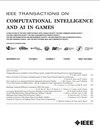EvoCommander:一款基于人工大脑之间进化和切换的新颖游戏
Q2 Computer Science
IEEE Transactions on Computational Intelligence and AI in Games
Pub Date : 2017-06-01
DOI:10.1109/TCIAIG.2016.2535416
引用次数: 16
摘要
神经进化[即通过进化算法进化人工神经网络]在进化智能体和机器人控制器方面显示出了前景,它们表现出复杂的行为并能够适应环境。这些特性也与电子游戏相关,因为它们可以延长游戏的寿命和可重放性。然而,目前大多数游戏的设计都排除了使用任何可能产生不可预测甚至开放式结果的技术。本文描述了EvoCommander游戏,目的是进一步展示神经进化在游戏中的潜力。在EvoCommander中,玩家为一个必须与其他玩家和计算机控制的机器人作战的简单机器人逐渐进化出一系列人工神经网络控制的行为(例如,远程攻击、逃跑等)。游戏引入了“大脑切换”这一新颖的游戏机制,可以选择哪种进化的神经网络在战斗中的任何时候都是活跃的。游戏测试的结果表明,大脑切换是一种很有前途的新游戏机制,导致玩家在训练机器人和在战斗中控制机器人时采用有趣的不同策略。本文章由计算机程序翻译,如有差异,请以英文原文为准。
EvoCommander: A Novel Game Based on Evolving and Switching Between Artificial Brains
Neuroevolution [i.e., evolving artificial neural networks (ANNs) through evolutionary algorithms] has shown promise in evolving agents and robot controllers, which display complex behaviors and can adapt to their environments. These properties are also relevant to video games, since they can increase their longevity and replayability. However, the design of most current games precludes the use of any techniques which might yield unpredictable or even open-ended results. This paper describes the game EvoCommander, with the goal to further demonstrate the potential of neuroevolution in games. In EvoCommander the player incrementally evolves an arsenal of ANN-controlled behaviors (e.g., ranged attack, flee, etc.) for a simple robot that has to battle other player and computer controlled robots. The game introduces the novel game mechanic of “brain switching,” selecting which evolved neural network is active at any point during battle. Results from playtests indicate that brain switching is a promising new game mechanic, leading to players employing interesting different strategies when training their robots and when controlling them in battle.
求助全文
通过发布文献求助,成功后即可免费获取论文全文。
去求助
来源期刊

IEEE Transactions on Computational Intelligence and AI in Games
COMPUTER SCIENCE, ARTIFICIAL INTELLIGENCE-COMPUTER SCIENCE, SOFTWARE ENGINEERING
CiteScore
4.60
自引率
0.00%
发文量
0
审稿时长
>12 weeks
期刊介绍:
Cessation. The IEEE Transactions on Computational Intelligence and AI in Games (T-CIAIG) publishes archival journal quality original papers in computational intelligence and related areas in artificial intelligence applied to games, including but not limited to videogames, mathematical games, human–computer interactions in games, and games involving physical objects. Emphasis is placed on the use of these methods to improve performance in and understanding of the dynamics of games, as well as gaining insight into the properties of the methods as applied to games. It also includes using games as a platform for building intelligent embedded agents for the real world. Papers connecting games to all areas of computational intelligence and traditional AI are considered.
 求助内容:
求助内容: 应助结果提醒方式:
应助结果提醒方式:


